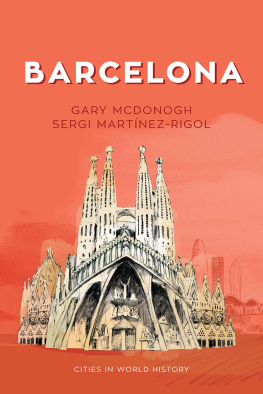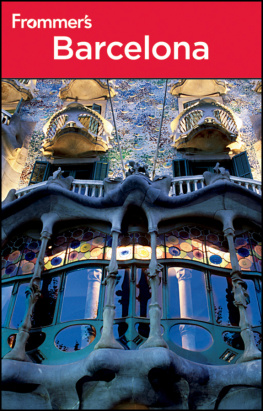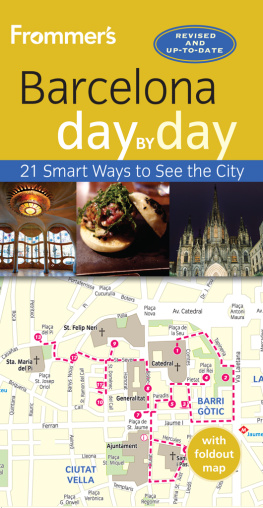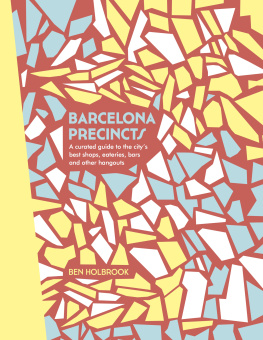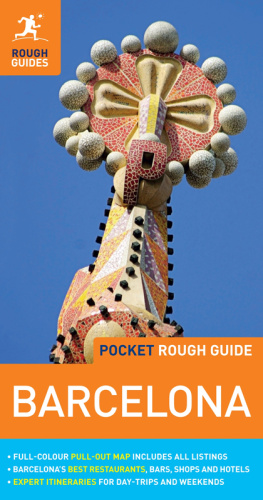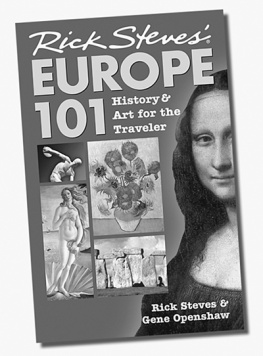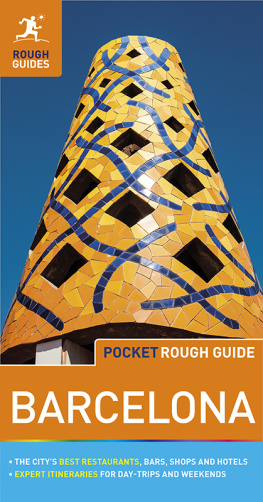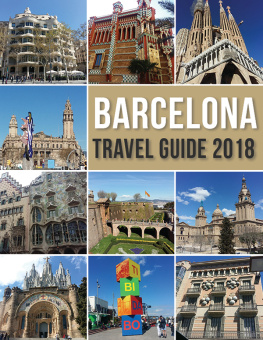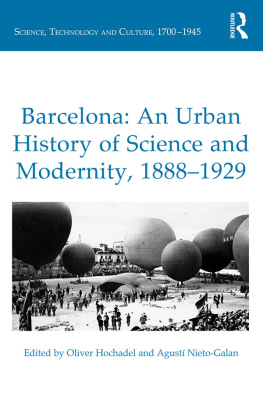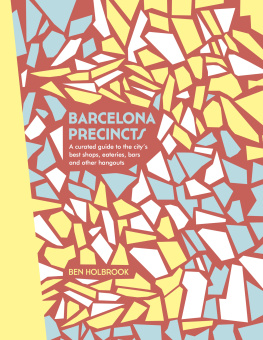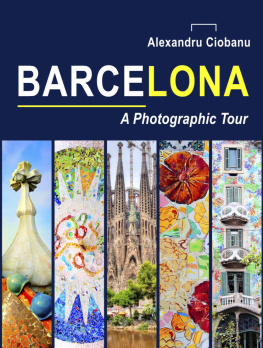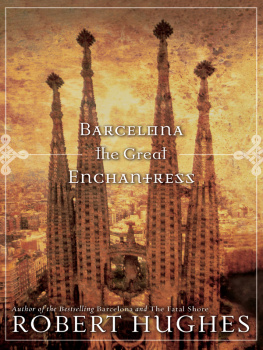
Cities in World History
Andrew Leach, Rome
Gary McDonogh and Sergi Martnez-Rigol, Barcelona
Barcelona
Gary McDonogh
Sergi Martnez-Rigol
polity
Copyright Gary McDonogh and Sergi Martnez-Rigol 2018
The right of Gary McDonogh and Sergi Martnez-Rigol to be identified as Authors of this Work has been asserted in accordance with the UK Copyright, Designs and Patents Act 1988.
First published in 2018 by Polity Press
Polity Press
65 Bridge Street
Cambridge CB2 1UR, UK
Polity Press
101 Station Landing
Suite 300
Medford, MA 02155, USA
All rights reserved. Except for the quotation of short passages for the purpose of criticism and review, no part of this publication may be reproduced, stored in a retrieval system or transmitted, in any form or by any means, electronic, mechanical, photocopying, recording or otherwise, without the prior permission of the publisher.
ISBN-13: 978-1-5095-1104-4
Library of Congress Cataloging-in-Publication Data
Names: McDonogh, Gary W., author. | Martnez Rigol, Sergi, author.
Title: Barcelona / Gary McDonogh, Sergi Martnez-Rigol.
Description: Cambridge ; Medford, MA : Polity, 2018. | Series: Cities in world history | Includes bibliographical references and index.
Identifiers: LCCN 2018009154 (print) | LCCN 2018024217 (ebook) | ISBN 9781509511044 (Epub) | ISBN 9780745670690 (hardback) | ISBN 9780745670706 (paperback)
Subjects: LCSH: Barcelona (Spain)--History. | Barcelona (Spain)--Civilization. | BISAC: HISTORY / General.
Classification: LCC DP402.B265 (ebook) | LCC DP402.B265 M38 2018 (print) | DDC 943.7/2--dc23
LC record available at https://lccn.loc.gov/2018009154
The publisher has used its best endeavors to ensure that the URLs for external websites referred to in this book are correct and active at the time of going to press. However, the publisher has no responsibility for the websites and can make no guarantee that a site will remain live or that the content is or will remain appropriate.
Every effort has been made to trace all copyright holders, but if any have been inadvertently overlooked the publisher will be pleased to include any necessary credits in any subsequent reprint or edition.
For further information on Polity, visit our website: politybooks.com
A les dones amb qui hem compartit la ciutat: Cindy, Larissa, Graciela, Isabel, Carla, Nura, Berta, Leila
I als amics
Acknowledgments
Together, our careers encompass nearly three-quarters of a century of research in Barcelona and many more years of friendship and collegiality. While it is easy to acknowledge those who have taught and shared with us directly, we need to begin with acknowledgment of many unnamed people who have shared their joy and experiences in the city with us, whether in exchanges in the market or marches in the street; endless discussions in bookstores; delight in restaurants; transcendance in theatres, cinemas, concerts and museums; or simple conversations with neighbors. While we have focused on explaining Barcelona as a human construction embodied in places and texts, our city is ultimately the city of the people, with all their discords as well as celebrations.
For McDonogh: direct acknowledgments begin with those who brought me to Barcelona for my dissertation, beginning with Susan Dunlap and incorporating graduate training and mentorship from Ed Hansen, Oriol Pi-Sunyer, Sid Mintz, Richard Price, Richard Kagan, Beatriz Lavandera, Flora Klein, Jean Copans and Katherine Verdery. In Barcelona, I found colleagues and teachers in Josefina Roma, Carles Carreras and family, Joan Josep Pujadas, Dolors Comas and others, as well as favorite students in Gaspar Maza and Xavi Camino. And a special thanks go to those Americans whose research overlapped with mine in the heady years of the transition and who have been interlocutors ever since Jim Amelang, Susan DiGiacomo and Kit Woolard; Jim and Xavier Gil deserve a special thanks for introducing me to the world of Barcelona guidebooks in our joint effort of 25 years ago. In addition to these, Barcelona has also been a space for friends and families, who again are too numerous to count Josep Maria and Angels, Gaspar, Xavi, Pili, Cari, Churri, Juan, Carlos and others.
Obviously, this project has matured through years of research and teaching, beginning with my graduate training at the University of Toronto and the Johns Hopkins University, and including support from Johns Hopkins, as well as the Council for European Studies and Social Science Research Council. Research and teaching about Barcelona continued with my work in Anthropology at New College USF and with my compadre Tony Andrews. Subsequently, as a participant in the marvelous experiment that is Growth and Structure of Cities at Bryn Mawr, I have learned from many people, including Barbara Lane, David Cast, Alice Donohue, Jeff Cohen, Madhavi Kale, Daniela Voith, Sam Olshin, Juan Arbona, Jun Zhang and Min Lee and I should not forget colleagues in Spanish and Latin American Studies, with whom I have shared art and culture: Maria Cristina Quintero, Enrique Sacerio Gar, Martn Gaspar and especially the late Gridley McKim-Smith. The college has also been generous in support for my work through funding and sabbaticals. Students, too, have asked me enough questions about Barcelona and other themes to keep me on my toes; I particularly appreciate Steve Trebachs readings and comments on various chapters in the manuscript.
Finally, Barcelona has been part of family life three decades of visits and residence with Cindy Wong (from the days when Chinese were hard to find in the city) and our two daughters, Larissa and Graciela McDonogh-Wong, who can detail the histories of the walls of the city by heart after years of walking the city with me but also know how to appreciate the breezes of Park Gell, the bustle of the Boqueria market, the joys of escaping to a Costa Brava beach and the wonders of allioli. Per sempre.
For Martnez-Rigol: in recognition of those friends and colleagues who have allowed me to carry out this project, one stands out, shared with McDonogh, and this is Carles Carreras and his mentorship. He introduced me to Barcelona, to Geography, and a particular way to read the city and the urban. My doctoral thesis was carried out under his direction on the gentrification process in the Raval neighborhood of Barcelona, defended in the year 2000. While I was researching the thesis, several colleagues and professors helped me to understand this part of the city from different perspectives, such as Antoni Riera Melis, Ferran Sagarra Trias and Gary McDonogh himself. I shared this dive into urban topics and, more specifically, Barcelona with several colleagues in the Department of Human Geography, such as Rosa Tello, Pere Lpez, Mercedes Marn, Lourdes Garca, Nria Benach, Elisabet Rosa, Assumpta Boba and Jorge Romero, as well as some others, more distant, such as Joan Vilagrasa, Aurora Garca Ballesteros, Joaqun Bosque, Jan van Weesep, Amalia Ins Geraiges de Lemos, Susana M. Miranda Pacheco and Teresa Barata.
With Carles Carreras, I have shared 22 years of teaching experience at the University of Barcelona, in undergraduate and masters degree courses, with Barcelona and the urban as a common factor. Also in his Walking through Barcelona, in which I have participated since 1998, and through it, I have learned about and taught Barcelona with him, Phillip Banks, Mary Nash, Xavier Gil, Mireia Freixa, Llus Frago, Ferran Segarra, Estanislau Roca and Ins Aquilu. Also I have shared with him editorial, cartographic and research projects in which Barcelona has been used as a laboratory, and which have allowed me to work and learn with Sergio Moreno, Roser Pubill, Marcia Cardim, Ernest Ruiz, Josep Serra and Gonzalo Bernardos in Barcelona, and Paulo Celso da Silva, Lida Viganoni, Rosario Sommella, Libera dAlessandro, Herculano Cachinho, Petros Petsimeris, Jos Gasca, Patricia Oliveira and Maria Laura Silveira abroad. The belief in the relevance of the urban in our society, and Barcelona as a case study, has led the research group in which I participate (Group of Commercial and Urban Studies) to the creation and delivery of a postgraduate course in Urban Studies at the University of Barcelona. Carles Carreras and lex Morcuende have tirelessly pushed the project, which enables sharing and learning with many connoisseurs of the reality of Barcelona. And undoubtedly the students doctorate, masters or degree continue to be a tireless source of discussion and learning for example, Eduard Montesinos, Beatriz Rocco, Meritxell Alcaiz and David Lloberas.
Next page
